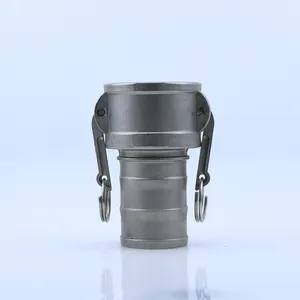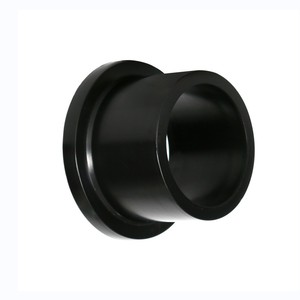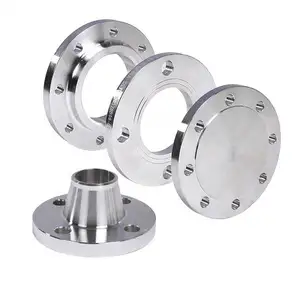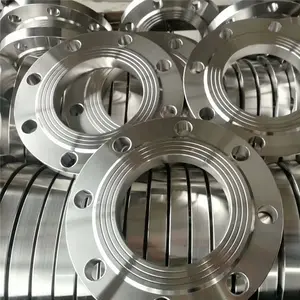What are Flanges
Flanges are a type of industrial hardware central to connecting pipes, valves, pumps, and other equipment to form a piping system. They provide easy access for cleaning, inspection, or modification and are usually welded or screwed to these systems. Flanges are designed to be joined by bolting with gaskets in between to ensure a tight seal.
The key users of flanges include professionals in the plumbing, water supply, petrochemical, and HVAC industries, as well as those involved in shipbuilding and various other forms of manufacturing and construction. Essentially, anyone involved with systems that transport fluids, gases, or particles may find themselves in need of flanges.
The principle of how flanges work is relatively straightforward: two flange plates, each connected to a pipe or piece of equipment, are aligned and then joined together with bolts that pass through the holes around the perimeter of each flange. The seal between the flanges is secured with a gasket. This design allows for both a strong connection that can handle high pressure and a connection that can be disassembled as needed.
Types of Flanges
The variety of flanges available caters to different pressures, temperatures, and the nature of the materials being transported. Some commonly used types include:
Weld Neck Flanges: Recognized by their long tapered hub, weld neck flanges are welded to the pipe. The tapering hub provides strength and supports the flange against dishing. They are ideal for high-pressure applications.
Slip-On Flanges: These flanges slide over the pipe and are then welded in place. They are easier to align than weld neck flanges and are typically used in lower pressure environments.
Blind Flanges: Used to seal the end of piping systems or pressure vessel openings, blind flanges have no bore and are often used for testing the flow of gas or liquid through a pipe or vessel.
Threaded Flanges: These are similar to slip-on flanges but have threads on the inner diameter that connect with matching threads on a pipe. They are suitable for low-pressure environments where welding could be hazardous.
Socket Weld Flanges: Designed for smaller pipe diameters, these flanges have a socket into which the pipe fits. They are then fillet welded for strength and are used in high-pressure applications.
Lap Joint Flanges: These work with stub ends that are welded to the pipe. The flange itself can move freely over the stub end, making it useful in systems that require frequent dismantling for inspection and cleaning.
How to choose Flanges
Selecting the right type of flange is crucial for ensuring system integrity, efficiency, and safety. When choosing flanges for business purposes, consider factors such as:
Material Compatibility: Choose a material that is compatible with the media flowing through the system (e.g., stainless steel for corrosive substances) and can withstand the operating temperature and pressure.
Standards Compliance: Ensure that the flange adheres to relevant standards (e.g., DIN, ASME) which indicate dimensions, tolerances, and pressure ratings compatible with your system's requirements.
Type of Connection: Different applications may call for different types of connections (welded, threaded). Consider ease of installation and maintenance when selecting a connection type.
Pressure Ratings: Match the pressure rating of the flange with your system's operating pressure to prevent leaks or failures due to overpressure.
Best Flanges on Alibaba.com
Alibaba.com stands as a global marketplace connecting businesses with an extensive range of industrial hardware, including an impressive selection of flanges suitable for various applications. Its comprehensive catalog ensures that businesses can find exactly what they need - whether they're looking for standard designs or require customized specifications. With Alibaba's proven track record since 1999, buyers can source from suppliers all around the world with confidence.
The platform's user-friendly interface simplifies the sourcing process by allowing buyers to filter based on standards like DIN or ASME, materials ranging from carbon steel to stainless steel alloys, and various support services like OEM or ODM - all ensuring that businesses find products tailored to their specific needs. Furthermore, Alibaba.com's Trade Assurance service provides an additional layer of protection by securing payments until delivery is confirmed.
Choosing Alibaba.com means tapping into a vast network where quality meets reliability. It offers businesses a straightforward path to equip their operations with suitable hardware essentials such as flanges while benefiting from global reach and logistical support that streamlines the procurement process no matter where they operate.
Common FAQs for Flanges
What are the most common types of flanges used in industrial applications?
The most common types of flanges used in industrial applications include weld neck, slip-on, blind, threaded, socket weld, and lap joint flanges. Each type caters to specific pressure ratings, temperatures, and uses.
How do I determine which material is best for my flange application?
Select a flange material that is compatible with the medium it will be in contact with, and that can withstand the operational temperature and pressure. Common materials include carbon steel, stainless steel, alloy steel, and aluminum.
What standards should I look for when selecting a flange?
Flanges should comply with recognized international standards such as DIN, ISO, ASME, GB, BS, and JPI. These standards ensure compatibility with your system's requirements and ease of integration.
Can I request custom flanges to fit unique system requirements?
Yes, you can request custom flanges with support services like OEM or ODM to meet specific dimensions, pressure ratings, or material composition based on unique system requirements.
What are the key factors to consider when choosing a flange for high-pressure applications?
For high-pressure applications, consider using flanges designed to handle such conditions like weld neck or socket weld flanges. Also evaluate the material strength and compliance with appropriate pressure standards.
Are there specific flanges recommended for piping systems that require frequent maintenance?
For systems requiring frequent maintenance or inspection, lap joint flanges are recommended because they allow easy disassembly and reassembly without compromising the integrity of the pipe.
How do I ensure a proper seal between connected flanges?
To ensure a proper seal between connected flanges, use the correct type of gasket for the chosen flange material and service condition. The bolts should be evenly tightened according to specification to prevent leaks.
Is it possible to get technical support for flange installation after purchase?
Technical support options vary by supplier. Some may offer video technical support or online assistance post-purchase. Always verify after-sales support capabilities before finalizing your purchase.
In what situations are blind flanges most appropriately used?
Blind flanges are most appropriate for sealing off sections of a pipeline or for closing the ends of piping systems and pressure vessel openings during maintenance operations or when future expansions are anticipated.
How does the choice of connection type affect my flange selection?
The choice of connection type affects installation ease and operational maintenance. Welded connections offer greater strength and leak resistance while threaded connections are better suited for easy assembly and disassembly in low-pressure applications.
What is the significance of color coding on flanges?
Color coding on flanges often indicates different materials or pressure ratings at a glance, which can help in quickly identifying the right type of flange needed for a particular application or system.
Are there any special considerations for using flanges in extreme temperatures?
When using flanges in extreme temperatures, it's essential to choose materials that can withstand thermal expansion or contraction without losing integrity. Special alloys or grades may be required for very high or low-temperature applications.
Can I find environmentally friendly options for flanges on Alibaba.com?
While specific environmentally friendly options may not be categorized as such, choosing long-lasting materials like stainless steel can be more sustainable due to their durability and corrosion resistance.
How does Alibaba.com ensure the quality of its listed flange suppliers?
Alibaba.com provides tools to review supplier credibility including business licenses and previous transaction history. However, it is recommended to conduct due diligence and utilize Alibaba.com’s Trade Assurance service for added transaction security.











































 浙公网安备 33010002000092号
浙公网安备 33010002000092号 浙B2-20120091-4
浙B2-20120091-4